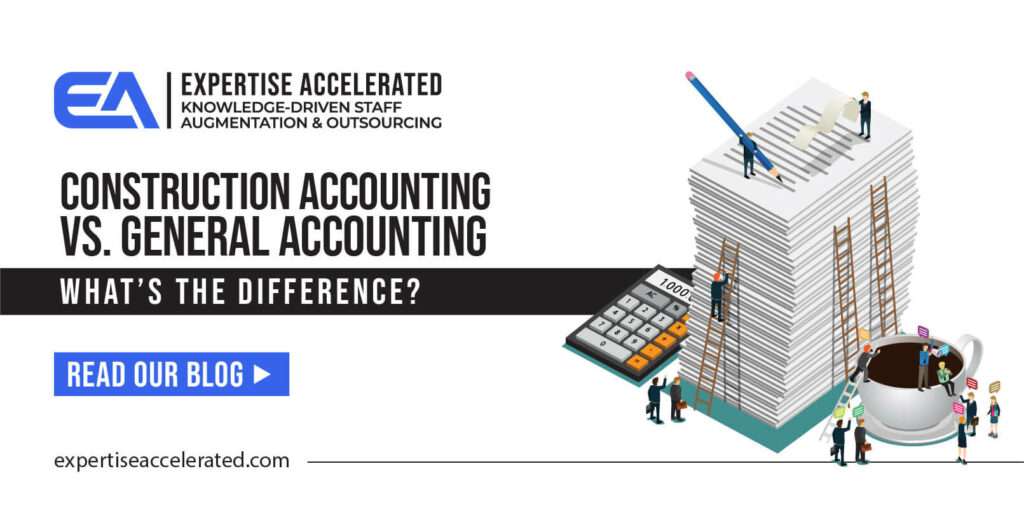Construction Accounting: Tools and Techniques to Optimize Your Financial Operations
Understanding the Significance of Building Audit for Successful Job Management

Function of Building Accountancy
Building and construction bookkeeping acts as the foundation of economic administration in the construction sector, making sure that jobs are completed within spending plan and monetary purposes are met. construction accounting. This specialized accountancy approach addresses the special difficulties encountered in building tasks, including differing job periods, fluctuating costs, and several stakeholders
Among the main duties of building and construction accounting is to provide accurate cost estimation and monitoring throughout the task lifecycle. This promotes enlightened decision-making, making it possible for task supervisors to readjust sources and timelines efficiently. Furthermore, construction accounting enhances cash money flow management by keeping track of accounts payable and receivable, thus making certain that funds are readily available for prompt repayments to providers and subcontractors.
Furthermore, construction audit help in compliance with sector guidelines and reporting requirements. It outfits job managers with the essential economic data to prepare detailed economic statements, which are essential for audits and monetary evaluations. By maintaining clear documents, building accounting promotes transparency and liability, vital components in constructing count on amongst stakeholders. Eventually, the duty of building accountancy expands beyond plain monetary tracking; it is integral to calculated planning and operational performance, driving the success of building tasks in a competitive landscape.
Key Components of Building Accountancy

Budgeting establishes an economic framework that guides job implementation, allowing supervisors to designate resources successfully and expect potential economic difficulties. Accurate price tracking is crucial for surveillance expenses in real-time, aiding to determine differences between projected and actual costs. This allows timely modifications to keep the job on budget.
In addition, financial coverage provides stakeholders with a clear photo of the project's economic health and wellness. Normal reports, such as earnings and loss statements and cash money flow evaluations, facilitate notified decision-making and boost transparency amongst all events included.
In addition, compliance with sector regulations and accountancy standards is vital. This ensures that monetary techniques are not only efficient yet also legal, securing the company versus legal consequences. By incorporating these key elements, building and construction accounting cultivates an organized strategy to managing monetary sources, inevitably contributing to the successful conclusion of building and construction projects.
Benefits for Job Supervisors
Leveraging reliable building and construction accountancy techniques gives task supervisors with a plethora of advantages that improve both functional effectiveness and monetary oversight. One significant advantage is improved budget plan monitoring. Exact monitoring of expenditures and profits enables project supervisors to check economic efficiency in real time, guaranteeing projects continue to be within budget plan and assisting in timely adjustments when necessary.
In addition, building and construction accountancy improves capital monitoring, making it possible for job managers to optimize and prepare for monetary requirements resource allowance. By comprehending cash money inflows and discharges, they can better handle payments to providers, staff members, and subcontractors, consequently avoiding expensive hold-ups.
Additionally, durable accounting systems supply comprehensive reporting capacities. Project managers can create reports that use understandings into task success, price variances, and resource application. This data-driven method cultivates informed decision-making, allowing supervisors to recognize potential problems proactively and carry out corrective procedures.
Last but not least, adherence to construction accountancy criteria ensures compliance with legal and regulative requirements, reducing the danger of charges or disagreements. In general, reliable building and construction bookkeeping furnishes project managers with the tools needed to drive task success, boost stakeholder self-confidence, and advertise long-term organizational development.
Common Challenges in Construction Bookkeeping
Numerous project managers experience considerable challenges in building bookkeeping that can hinder project success. One of the primary obstacles is the intricacy of tracking multiple task sites, each with distinct budgets, timelines, and source appropriations. This calls for thorough interest to detail, which can be overwhelming without a durable audit system in position.
In addition, changing product costs and labor prices can make complex budget plan management, making accurate projecting tough. Project managers usually battle to resolve these expenses with real expenses, resulting in potential economic inconsistencies.
Furthermore, construction audit includes compliance with numerous policies, including tax obligation obligations and labor regulations. Navigating these regulations can be overwhelming, especially for supervisors that may not have a solid accountancy background.
An additional significant obstacle is managing capital, which is critical in the building industry. Delays in invoicing, settlements from clients, or unanticipated project adjustments can create money circulation lacks, threatening the project's development.
Lastly, efficient interaction between job supervisors, accountants, and field groups is vital. Misunderstandings can cause inaccurate monetary coverage, further complicating task monitoring efforts. her explanation Addressing these challenges proactively is crucial for successful building accountancy.

Ideal Practices for Effective Accounting
While navigating the complexities of construction accounting can be challenging, adopting best practices can significantly enhance economic monitoring and task success. One essential method is preserving prompt and precise records. Executing robust audit software program customized to building and construction projects can streamline information access, invoicing, and coverage, conserving and decreasing errors time.
In addition, developing a clear budget plan and regular surveillance against this budget are crucial. Using a system of regular financial testimonials enables job managers to recognize variations early, helping with prompt decision-making. It is likewise important to different job prices into indirect and direct categories, allowing clearer understandings into earnings.
Another click for info finest practice includes fostering open communication amongst all stakeholders. Normal updates and collaborative conversations about monetary status can make sure every person is lined up and educated. Training personnel in construction-specific accounting principles better enhances proficiency and precision.
Lastly, making certain compliance with appropriate audit standards and guidelines is non-negotiable. Normal audits and internal evaluations add to transparency and accountability, developing trust with stakeholders and customers. By concentrating on these finest techniques, construction firms can enhance their audit processes, ultimately driving job success and economic security.
Verdict
To conclude, building accountancy plays a crucial duty in ensuring successful job administration by assisting in exact economic oversight and boosting decision-making. By incorporating key components such as cost estimation, capital management, and compliance, project managers can navigate usual obstacles and leverage ideal techniques for reliable audit. Inevitably, a durable building and construction audit structure not just safeguards budget plan stability but also adds to the overall financial wellness of building and construction tasks, promoting sustainable success within the industry.
By integrating these vital parts, building bookkeeping fosters a structured strategy to taking care of monetary resources, ultimately adding to the successful completion of building and construction jobs.
Accurate monitoring of incomes and expenses permits job supervisors to keep an eye on economic performance in real time, making certain jobs remain within spending plan and assisting in timely changes when required.
Task managers can generate records that offer understandings into task success, price variations, and resource usage.Many job managers come across significant obstacles in construction audit that can hinder task success. construction accounting. Ultimately, a durable construction accountancy framework not only safeguards spending plan why not find out more integrity however also contributes to the total financial health and wellness of building and construction projects, promoting lasting success within the industry